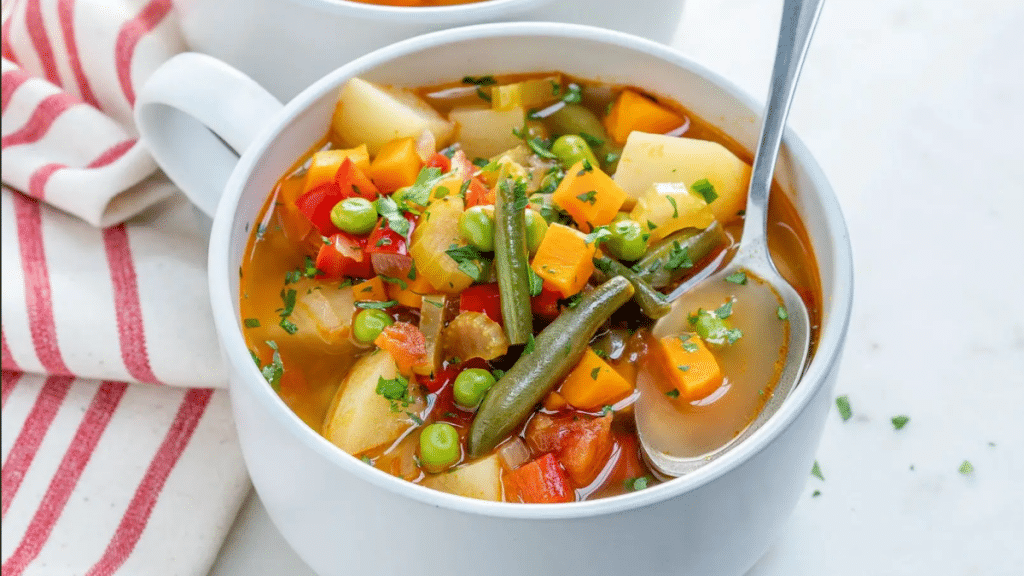Soup has been a beloved comfort food for centuries, and for good reason. Not only does a warm bowl of soup provide immediate comfort on a chilly winter day, but it also offers a myriad of health benefits. One of the biggest advantages of homemade soup is the control you have over the ingredients. Unlike store-bought soups, homemade versions allow you to choose fresh, organic, and nutrient-rich ingredients, making them a healthier option overall.
Additionally, homemade soups are often lower in sodium compared to their packaged counterparts. By making your own soup, you can adjust the seasoning to your liking, ensuring a healthier and more balanced meal. Another benefit of homemade soup is the ability to customize it to your dietary preferences. Whether you’re vegetarian, vegan, or following a specific diet, there are endless possibilities for creating a delicious and nutritious soup that meets your needs.
Health Benefits of Homemade Soup
Homemade soup is not only delicious but also packed with essential nutrients that can boost your overall health. The combination of vegetables, lean proteins, and whole grains found in many soup recipes provides a wide range of vitamins, minerals, and antioxidants. These nutrients support immune function, promote healthy digestion, and contribute to overall well-being.
Vegetable-based soups, such as minestrone or butternut squash soup, are rich in fiber, which aids in digestion and helps maintain a healthy weight. The high water content of soups also helps to keep you hydrated, especially during the winter months when dehydration can be a concern. Furthermore, studies have shown that consuming soup as a starter before a meal can help reduce calorie intake and promote weight loss.

Essential Ingredients for Homemade Soup Recipes
When it comes to making homemade soup, the possibilities are endless. However, there are a few essential ingredients that form the base of many popular soup recipes. These ingredients add depth of flavor, texture, and nutritional value to your soups.
- Broth or stock: A good soup starts with a flavorful base. Whether you prefer chicken, beef, vegetable, or bone broth, using a high-quality broth or stock will enhance the taste of your soup.
- Aromatics: Onions, garlic, and celery are common aromatics that add depth and flavor to soups.
- Vegetables: From carrots and potatoes to leafy greens and bell peppers, adding a variety of vegetables to your soup provides essential vitamins, minerals, and fiber.
- Protein: Whether you prefer chicken, beef, seafood, or plant-based protein sources like tofu or legumes, adding protein to your soup makes it a more satisfying and complete meal.
- Herbs and spices: A pinch of herbs and spices can transform a simple soup into a flavorful masterpiece. Experiment with different combinations to find your favorite flavor profiles.
Popular Types of Homemade Soup Recipes
When it comes to homemade soup, there is a wide array of options to choose from. Here are some popular types of homemade soup recipes that are guaranteed to warm your soul:
1. Chicken Noodle Soup: A classic favorite that never disappoints. This comforting soup is made with tender chicken, vegetables, and noodles simmered in a flavorful broth.
2. Tomato Bisque: Creamy and rich, tomato bisque is a delightful twist on traditional tomato soup. Made with fresh tomatoes, herbs, and a touch of cream, this soup is perfect for tomato lovers.
3. Butternut Squash Soup: Velvety smooth and slightly sweet, butternut squash soup is a winter favorite. Roasted butternut squash is blended with aromatic spices to create a comforting and nutritious soup.
4. Minestrone: Packed with vegetables, beans, and pasta, minestrone is a hearty and satisfying soup that is perfect for a cold winter’s day.
5. Chili: For those who like a bit of heat, chili is the ultimate comfort food. Made with ground meat, beans, and spices, chili is a crowd-pleaser that can be customized to suit your taste.
Easy Homemade Soup Recipes for Beginners
If you’re new to the world of togelon, don’t worry. There are plenty of easy recipes that even beginners can master. Here are a few delicious and straightforward homemade soup recipes to get you started:
- Vegetable Soup: A medley of colorful vegetables simmered in a flavorful broth, vegetable soup is a nutritious and easy-to-make option. Simply chop your favorite vegetables, sauté them in a pot, add broth, and simmer until tender.
- Chicken Tortilla Soup: This Mexican-inspired soup is bursting with flavor. Simply combine shredded chicken, tomatoes, onions, spices, and chicken broth in a pot, and simmer until the flavors meld together. Serve with tortilla chips and your favorite toppings.
- Lentil Soup: Lentils are not only nutritious but also cook quickly, making them perfect for a quick and hearty soup. Sauté onions, carrots, and celery, add lentils, spices, and broth, and simmer until the lentils are tender. Serve with a squeeze of lemon for added brightness.
Vegetarian and Vegan Homemade Soup Recipes
For those following a vegetarian or vegan lifestyle, homemade soups offer endless possibilities. Here are a few vegetarian and vegan soup recipes that are sure to satisfy:
- Roasted Red Pepper Soup: Roasted red peppers blended with vegetable broth, garlic, and spices create a vibrant and flavorful soup that is both vegan and gluten-free. Serve with a dollop of dairy-free yogurt for added creaminess.
- Curried Cauliflower Soup: This creamy and fragrant soup is made with roasted cauliflower, coconut milk, and a blend of aromatic spices. It’s the perfect soup to warm you up on a cold winter night.
- Black Bean Soup: Packed with protein and fiber, black bean soup is a satisfying and nutritious choice. Simmer black beans with onions, garlic, spices, and vegetable broth, and garnish with avocado and cilantro for a burst of freshness.

Homemade Soup Recipes for Special Dietary Needs
If you have specific dietary needs or restrictions, there are homemade soup recipes that can accommodate your requirements. Here are a few options for different dietary needs:
- Gluten-Free Soup: Swap out regular pasta or flour for gluten-free alternatives like rice noodles or chickpea flour to make your soup gluten-free.
- Dairy-Free Soup: Use plant-based milk or dairy alternatives like coconut milk or almond milk in creamy soups to make them dairy-free.
- Low-Sodium Soup: Reduce the amount of salt in your soup and use herbs, spices, and other flavor enhancers to add depth and taste.
Tips for Making the Perfect Homemade Soup
While making homemade soup is relatively simple, a few tips and tricks can elevate your soup from good to extraordinary:
- Layer flavors: Sautéing onions, garlic, and other aromatics before adding the rest of the ingredients can deepen the flavor of your soup.
- Simmer low and slow: Allow your soup to simmer on low heat for a longer period to allow the flavors to develop and meld together.
- Don’t overcook: Be mindful not to overcook vegetables or proteins in your soup, as they can become mushy and lose their texture.
- Adjust seasoning: Taste your soup as it cooks and adjust the seasoning to your liking. Remember, you can always add more but cannot take away.
- Make ahead and freeze: Soups often taste even better the next day, so consider making a large batch and freezing individual portions for later.
Final Tips
Homemade soup is the epitome of comfort and nourishment. Whether you’re in the mood for a classic chicken noodle soup or want to explore more adventurous flavors, the world of homemade soups has something for everyone. By making your own soup, you have complete control over the ingredients, making it a healthier and more customizable option.
From the health benefits of homemade soup to essential ingredients and easy recipes for beginners, this article has covered all the bases. So, grab your ladle, gather your ingredients, and get ready to warm your winter with a bowl of homemade soup. With so many delicious options to choose from, you’ll never run out of ideas to keep your taste buds satisfied and your body nourished. Happy cooking!
